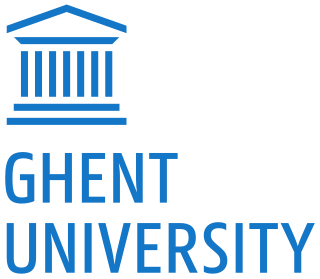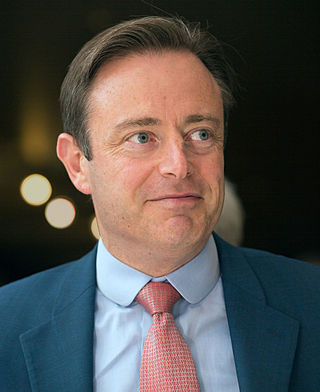
Flanders is the Dutch-speaking northern portion of Belgium and one of the communities, regions and language areas of Belgium. However, there are several overlapping definitions, including ones related to culture, language, politics, and history, and sometimes involving neighbouring countries. The demonym associated with Flanders is Fleming, while the corresponding adjective is Flemish, which can also refer to the collective of Dutch dialects spoken in that area. The official capital of Flanders is the City of Brussels, although the Brussels-Capital Region that includes it has an independent regional government. The powers of the government of Flanders consist, among others, of economic affairs in the Flemish Region and the community aspects of Flanders life in Brussels, such as Flemish culture and education.

Ghent is a city and a municipality in the Flemish Region of Belgium. It is the capital and largest city of the East Flanders province, and the third largest in the country, after Brussels and Antwerp. It is a port and university city.
Articles related to Belgium include:

Ghent University is a public research university located in Ghent, Belgium.

The Flemish Movement is an umbrella term which encompasses various political groups in the Belgian region of Flanders and, less commonly, in French Flanders. Ideologically, it encompasses groups which have sought to promote Flemish culture and the Dutch language as well as those seeking greater political autonomy for Flanders within Belgium. It also encompassed nationalists who seek the secession of Flanders from Belgium, either through outright independence or unification with the Netherlands.

The Flemish Region, usually simply referred to as Flanders, is one of the three regions of Belgium—alongside the Walloon Region and the Brussels-Capital Region. Covering the northern portion of the country, the Flemish Region is primarily Dutch-speaking. With an area of 13,522 km2 (5,221 sq mi), it accounts for only 45% of Belgium's territory, but 57% of its population. It is one of the most densely populated regions of Europe with around 490/km2 (1,300/sq mi).

KBC Group is a Belgian universal multi-channel bank-insurer, focusing on private clients and small and medium-sized enterprises in Belgium, Bulgaria, Czech Republic, Hungary, and Slovakia. It was created in 1998 through the merger of Kredietbank (KB), the cooperative CERA Bank, ABB Insurance, and Fidelitas Insurance. The acronym KBC refers to KredietBank and CERA.

The Flemish Diamond is the Flemish reference to a network of four metropolitan areas in Belgium, three of which are in the central provinces of Flanders, together with the Brussels-Capital Region. It consists of four agglomerations which form the four corners of an abstract diamond shape: Brussels, Ghent, Antwerp and Leuven.

Matthias Edward Storme is a Belgian lawyer, academic and conservative philosopher.

VIB is a research institute located in Flanders, Belgium. It was founded by the Flemish government in 1995, and became a full-fledged institute on 1 January 1996. The main objective of VIB is to strengthen the excellence of Flemish life sciences research and to turn the results into new economic growth. VIB spends almost 80% of its budget on research activities, while almost 12% is spent on technology transfer activities and stimulating the creation of new businesses, in addition VIB spends approximately 2% on socio-economic activities. VIB is member of EU-LIFE, an alliance of leading life sciences research centres in Europe.
The education in the Flemish Community covers the Dutch-speaking part of Belgium and consists of three networks (netten): government-provided education (gemeenschapsonderwijs), subsidized public schools and subsidized free schools.
Science and technology in Flanders, being the Flemish Community and more specifically the northern region of Belgium (Europe), is well developed with the presence of several universities and research institutes. These are strongly spread over all Flemish cities, from Kortrijk and Bruges in the Western side, over Ghent as a major university center alongside Antwerp, Brussels and Leuven to Hasselt and Diepenbeek in the Eastern side.

Bart Albert Liliane De Wever is a Belgian politician. Since 2004, De Wever has been the leader of the New Flemish Alliance (N-VA), a political party advocating for the independence of Flanders. He is also a member of the Chamber of Representatives. De Wever presided over his party's victory in the 2010 federal elections when N-VA became the largest party in both Flanders and in Belgium as a whole.

State reform, in the context of Belgium, is the ongoing process of seeking and finding constitutional and legal solutions to the problems and tensions in the different segments of the Belgian population, mostly between the Dutch-speakers of Flanders and the French-speakers of Wallonia. In general, Belgium has evolved from a unitary state to a federal state with communities, regions, and language areas.

Leuven railway station is the main railway station in Leuven, Flemish Brabant, Belgium. The station is operated by the National Railway Company of Belgium (NMBS/SNCB) and is located on railway line 36. In 2007, it was the fifth-busiest station in Belgium, only preceded by the three main Brussels stations and Gent-Sint-Pieters railway station.
The LVSV(Liberaal Vlaams StudentenVerbond or Liberal Flemish Students' Association) unites all Dutch speaking classical-liberal and libertarian students in Belgium. The values they uphold are individual freedom, freedom of speech, free trade and human rights, with focus on the non-aggression principle. The LVSV opposes big government in any meaning. They are an independent organisation, not affiliated to any political party. The LVSV organises political activities as well as typical student activities in five cities: Antwerp, Brussels, Ghent, Hasselt and Leuven. There currently is no national president. Famous former members include Guy Verhofstadt, Bart De Wever (N-VA), Zuhal Demir (N-VA), Willy De Clercq, Karel De Gucht and Egbert Lachaert.
Katholiek Vlaams Hoogstudentenverbond (KVHV) or the Catholic Flemish Students' Union is a political student society which concerns Flemish nationalism and conservatism. It accepts male and female members and has chapters in Ghent, Leuven, Antwerp, Brussels, Aalst and Sint-Katelijne-Waver. Previously KVHV had chapters in Kortrijk, Ostend, and Mechelen.

The Catholic University of Leuven was one of Belgium's major universities. It split along linguistic lines after a period of civil unrest in 1967–68 commonly known as the Leuven Affair in French and Flemish Leuven, based on a contemporary slogan, in Dutch. The crisis shook Belgian politics and led to the fall of the government of Paul Vanden Boeynants. It marked an escalation of the linguistic tension in Belgium after World War II and had lasting consequences for other bilingual institutions in Belgium within higher education and politics alike. In 1970 the first of several state reforms occurred, marking the start of Belgium's transition to a federal state.











